Mortality Reduction with Oral Beta-Blockers in Acute Coronary Syndrome
VerifiedAdded on 2020/07/23
|7
|2004
|36
Report
AI Summary
This report delves into the critical topic of mortality reduction in patients suffering from Acute Coronary Syndrome (ACS), focusing on the efficacy of oral beta-blockers as a key treatment strategy. The report begins with a comprehensive literature review, defining ACS and its associated terminology, including the blockage of arteries supplying the heart due to clots, and discussing the major contributing factors like unhealthy lifestyles and genetic predispositions. It explores the impact of beta-blocker treatments, emphasizing the critical importance of early intervention within 24 hours of symptom onset. The analysis includes a multicentric study that highlights a significant reduction in mortality rates among patients treated with beta-blockers within this timeframe. The report also examines the relationship between beta-blockers and various ACS conditions, such as sustained ventricular arrhythmia, and underscores the importance of early hospital admission for effective clinical administration. Furthermore, it underscores the need for lifestyle modifications and awareness campaigns to mitigate the risk of ACS. The report concludes by summarizing the findings, reiterating the effectiveness of beta-blockers in reducing mortality and highlighting the significance of timely medical intervention and medication guidelines in improving patient outcomes.
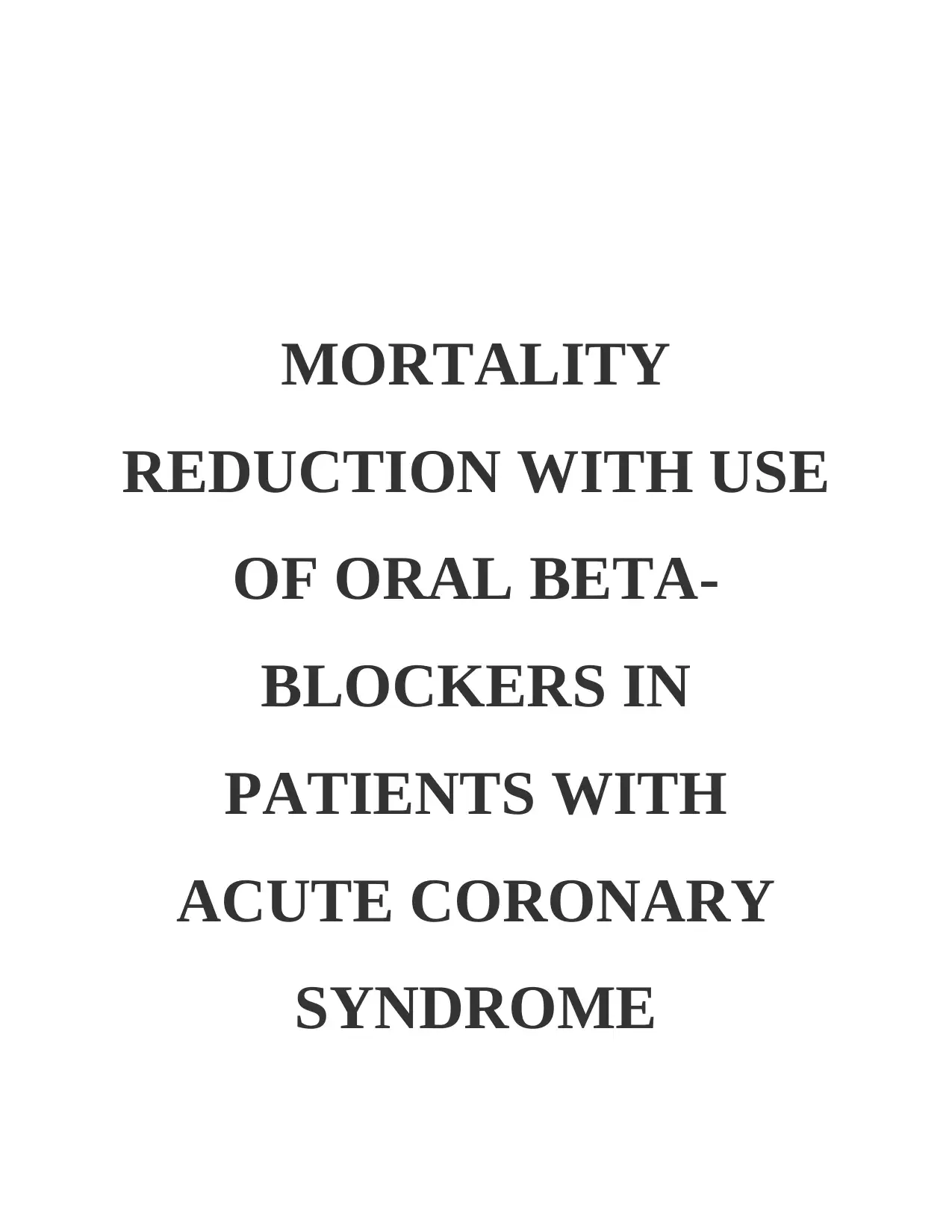
MORTALITY
REDUCTION WITH USE
OF ORAL BETA-
BLOCKERS IN
PATIENTS WITH
ACUTE CORONARY
SYNDROME
REDUCTION WITH USE
OF ORAL BETA-
BLOCKERS IN
PATIENTS WITH
ACUTE CORONARY
SYNDROME
Paraphrase This Document
Need a fresh take? Get an instant paraphrase of this document with our AI Paraphraser
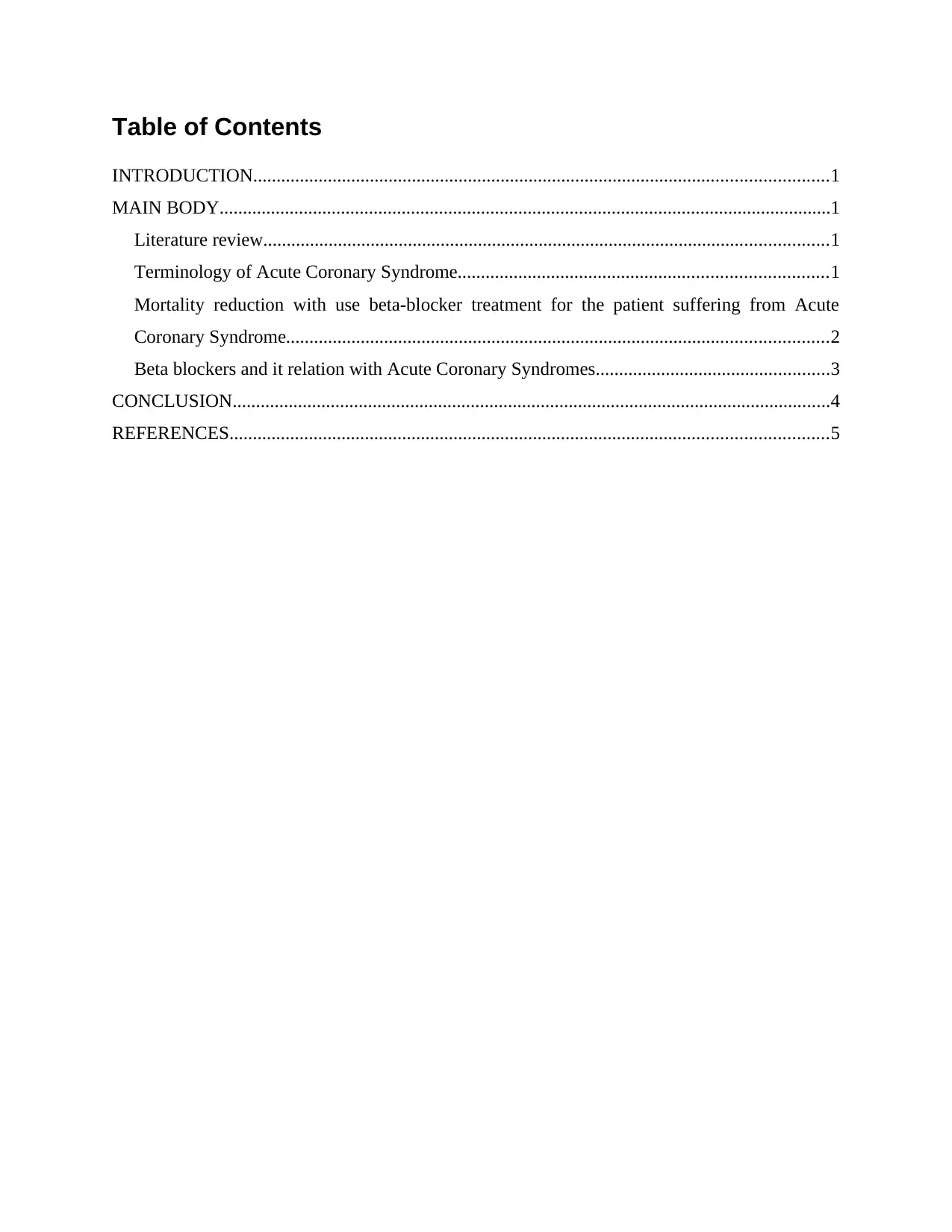
Table of Contents
INTRODUCTION...........................................................................................................................1
MAIN BODY...................................................................................................................................1
Literature review.........................................................................................................................1
Terminology of Acute Coronary Syndrome...............................................................................1
Mortality reduction with use beta-blocker treatment for the patient suffering from Acute
Coronary Syndrome....................................................................................................................2
Beta blockers and it relation with Acute Coronary Syndromes..................................................3
CONCLUSION................................................................................................................................4
REFERENCES................................................................................................................................5
INTRODUCTION...........................................................................................................................1
MAIN BODY...................................................................................................................................1
Literature review.........................................................................................................................1
Terminology of Acute Coronary Syndrome...............................................................................1
Mortality reduction with use beta-blocker treatment for the patient suffering from Acute
Coronary Syndrome....................................................................................................................2
Beta blockers and it relation with Acute Coronary Syndromes..................................................3
CONCLUSION................................................................................................................................4
REFERENCES................................................................................................................................5
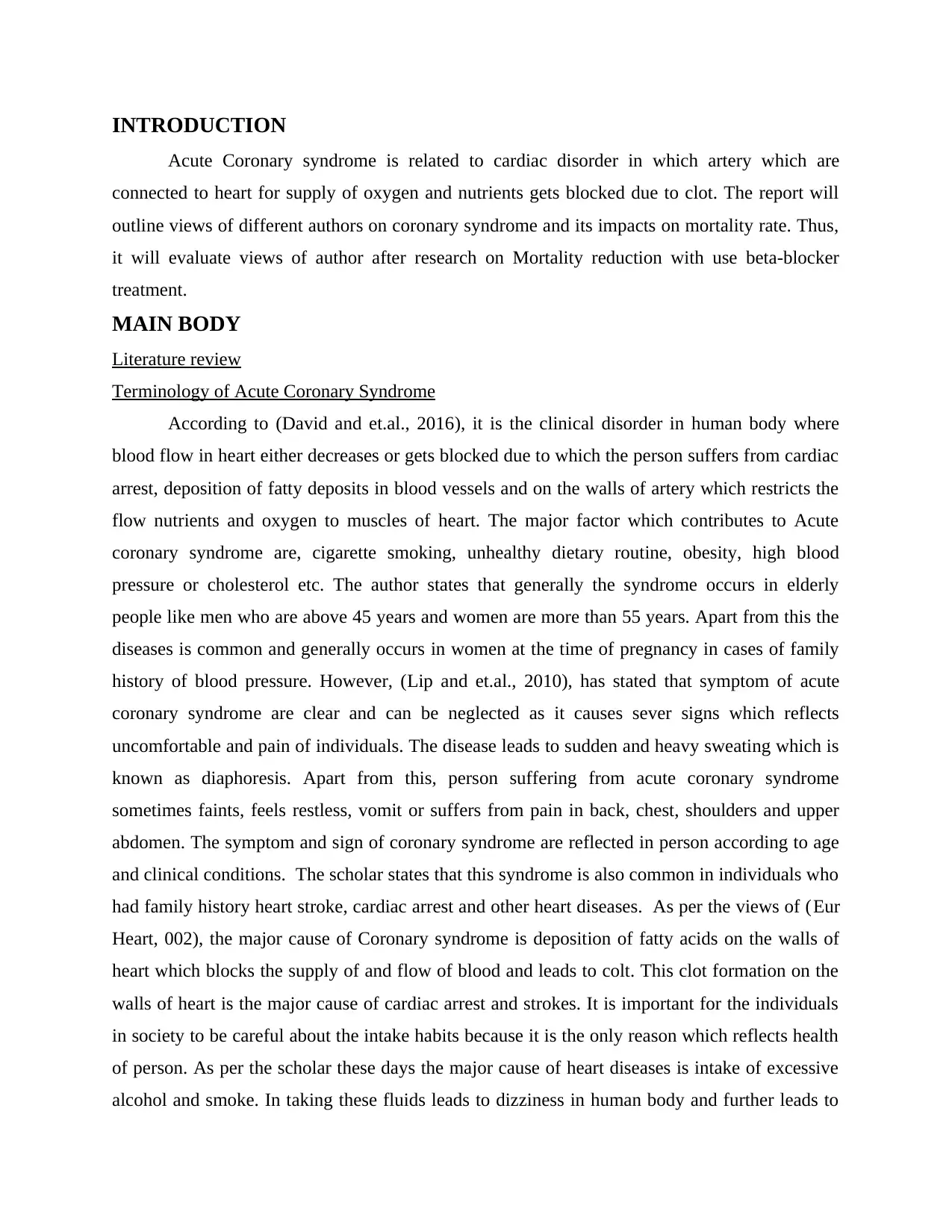
INTRODUCTION
Acute Coronary syndrome is related to cardiac disorder in which artery which are
connected to heart for supply of oxygen and nutrients gets blocked due to clot. The report will
outline views of different authors on coronary syndrome and its impacts on mortality rate. Thus,
it will evaluate views of author after research on Mortality reduction with use beta-blocker
treatment.
MAIN BODY
Literature review
Terminology of Acute Coronary Syndrome
According to (David and et.al., 2016), it is the clinical disorder in human body where
blood flow in heart either decreases or gets blocked due to which the person suffers from cardiac
arrest, deposition of fatty deposits in blood vessels and on the walls of artery which restricts the
flow nutrients and oxygen to muscles of heart. The major factor which contributes to Acute
coronary syndrome are, cigarette smoking, unhealthy dietary routine, obesity, high blood
pressure or cholesterol etc. The author states that generally the syndrome occurs in elderly
people like men who are above 45 years and women are more than 55 years. Apart from this the
diseases is common and generally occurs in women at the time of pregnancy in cases of family
history of blood pressure. However, (Lip and et.al., 2010), has stated that symptom of acute
coronary syndrome are clear and can be neglected as it causes sever signs which reflects
uncomfortable and pain of individuals. The disease leads to sudden and heavy sweating which is
known as diaphoresis. Apart from this, person suffering from acute coronary syndrome
sometimes faints, feels restless, vomit or suffers from pain in back, chest, shoulders and upper
abdomen. The symptom and sign of coronary syndrome are reflected in person according to age
and clinical conditions. The scholar states that this syndrome is also common in individuals who
had family history heart stroke, cardiac arrest and other heart diseases. As per the views of (Eur
Heart, 002), the major cause of Coronary syndrome is deposition of fatty acids on the walls of
heart which blocks the supply of and flow of blood and leads to colt. This clot formation on the
walls of heart is the major cause of cardiac arrest and strokes. It is important for the individuals
in society to be careful about the intake habits because it is the only reason which reflects health
of person. As per the scholar these days the major cause of heart diseases is intake of excessive
alcohol and smoke. In taking these fluids leads to dizziness in human body and further leads to
Acute Coronary syndrome is related to cardiac disorder in which artery which are
connected to heart for supply of oxygen and nutrients gets blocked due to clot. The report will
outline views of different authors on coronary syndrome and its impacts on mortality rate. Thus,
it will evaluate views of author after research on Mortality reduction with use beta-blocker
treatment.
MAIN BODY
Literature review
Terminology of Acute Coronary Syndrome
According to (David and et.al., 2016), it is the clinical disorder in human body where
blood flow in heart either decreases or gets blocked due to which the person suffers from cardiac
arrest, deposition of fatty deposits in blood vessels and on the walls of artery which restricts the
flow nutrients and oxygen to muscles of heart. The major factor which contributes to Acute
coronary syndrome are, cigarette smoking, unhealthy dietary routine, obesity, high blood
pressure or cholesterol etc. The author states that generally the syndrome occurs in elderly
people like men who are above 45 years and women are more than 55 years. Apart from this the
diseases is common and generally occurs in women at the time of pregnancy in cases of family
history of blood pressure. However, (Lip and et.al., 2010), has stated that symptom of acute
coronary syndrome are clear and can be neglected as it causes sever signs which reflects
uncomfortable and pain of individuals. The disease leads to sudden and heavy sweating which is
known as diaphoresis. Apart from this, person suffering from acute coronary syndrome
sometimes faints, feels restless, vomit or suffers from pain in back, chest, shoulders and upper
abdomen. The symptom and sign of coronary syndrome are reflected in person according to age
and clinical conditions. The scholar states that this syndrome is also common in individuals who
had family history heart stroke, cardiac arrest and other heart diseases. As per the views of (Eur
Heart, 002), the major cause of Coronary syndrome is deposition of fatty acids on the walls of
heart which blocks the supply of and flow of blood and leads to colt. This clot formation on the
walls of heart is the major cause of cardiac arrest and strokes. It is important for the individuals
in society to be careful about the intake habits because it is the only reason which reflects health
of person. As per the scholar these days the major cause of heart diseases is intake of excessive
alcohol and smoke. In taking these fluids leads to dizziness in human body and further leads to
⊘ This is a preview!⊘
Do you want full access?
Subscribe today to unlock all pages.

Trusted by 1+ million students worldwide
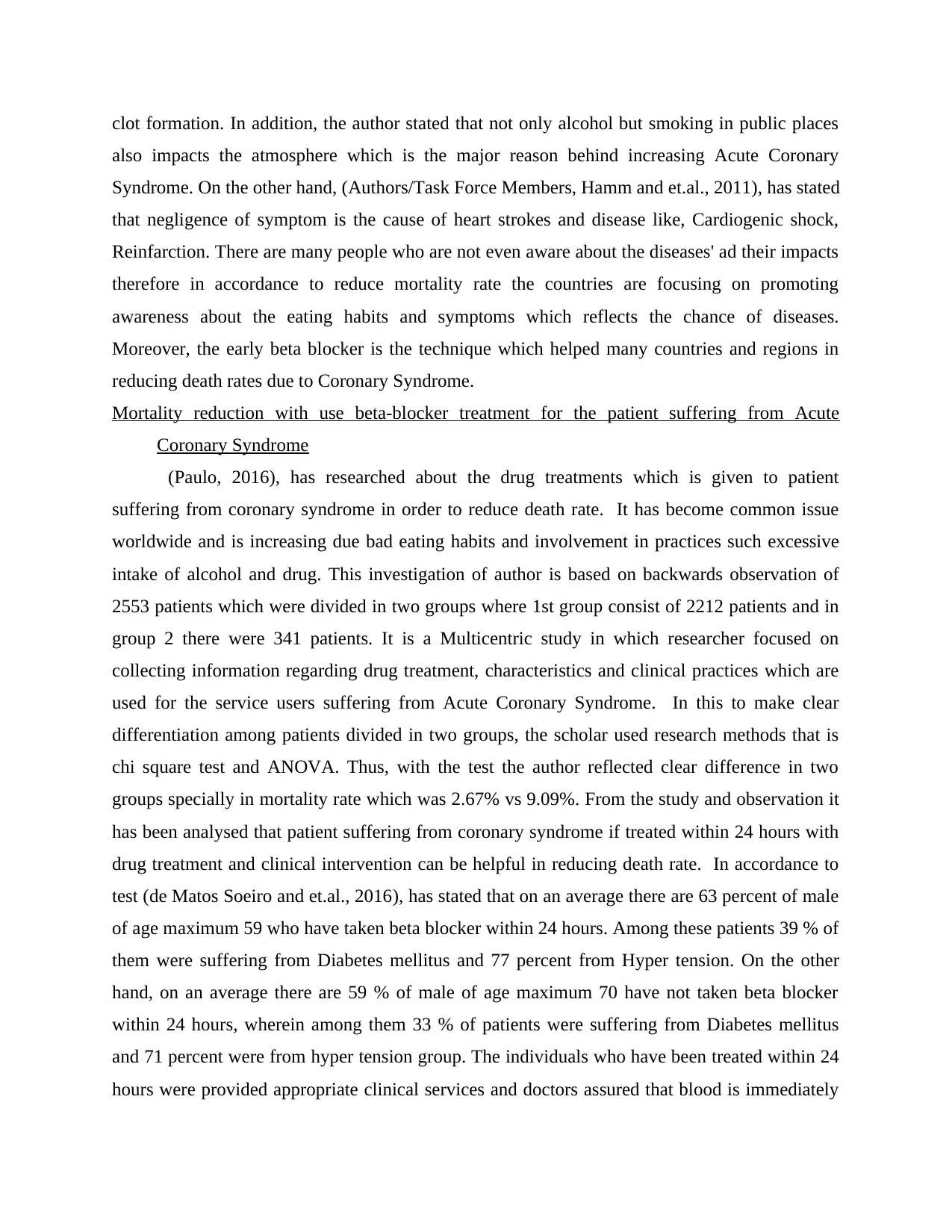
clot formation. In addition, the author stated that not only alcohol but smoking in public places
also impacts the atmosphere which is the major reason behind increasing Acute Coronary
Syndrome. On the other hand, (Authors/Task Force Members, Hamm and et.al., 2011), has stated
that negligence of symptom is the cause of heart strokes and disease like, Cardiogenic shock,
Reinfarction. There are many people who are not even aware about the diseases' ad their impacts
therefore in accordance to reduce mortality rate the countries are focusing on promoting
awareness about the eating habits and symptoms which reflects the chance of diseases.
Moreover, the early beta blocker is the technique which helped many countries and regions in
reducing death rates due to Coronary Syndrome.
Mortality reduction with use beta-blocker treatment for the patient suffering from Acute
Coronary Syndrome
(Paulo, 2016), has researched about the drug treatments which is given to patient
suffering from coronary syndrome in order to reduce death rate. It has become common issue
worldwide and is increasing due bad eating habits and involvement in practices such excessive
intake of alcohol and drug. This investigation of author is based on backwards observation of
2553 patients which were divided in two groups where 1st group consist of 2212 patients and in
group 2 there were 341 patients. It is a Multicentric study in which researcher focused on
collecting information regarding drug treatment, characteristics and clinical practices which are
used for the service users suffering from Acute Coronary Syndrome. In this to make clear
differentiation among patients divided in two groups, the scholar used research methods that is
chi square test and ANOVA. Thus, with the test the author reflected clear difference in two
groups specially in mortality rate which was 2.67% vs 9.09%. From the study and observation it
has been analysed that patient suffering from coronary syndrome if treated within 24 hours with
drug treatment and clinical intervention can be helpful in reducing death rate. In accordance to
test (de Matos Soeiro and et.al., 2016), has stated that on an average there are 63 percent of male
of age maximum 59 who have taken beta blocker within 24 hours. Among these patients 39 % of
them were suffering from Diabetes mellitus and 77 percent from Hyper tension. On the other
hand, on an average there are 59 % of male of age maximum 70 have not taken beta blocker
within 24 hours, wherein among them 33 % of patients were suffering from Diabetes mellitus
and 71 percent were from hyper tension group. The individuals who have been treated within 24
hours were provided appropriate clinical services and doctors assured that blood is immediately
also impacts the atmosphere which is the major reason behind increasing Acute Coronary
Syndrome. On the other hand, (Authors/Task Force Members, Hamm and et.al., 2011), has stated
that negligence of symptom is the cause of heart strokes and disease like, Cardiogenic shock,
Reinfarction. There are many people who are not even aware about the diseases' ad their impacts
therefore in accordance to reduce mortality rate the countries are focusing on promoting
awareness about the eating habits and symptoms which reflects the chance of diseases.
Moreover, the early beta blocker is the technique which helped many countries and regions in
reducing death rates due to Coronary Syndrome.
Mortality reduction with use beta-blocker treatment for the patient suffering from Acute
Coronary Syndrome
(Paulo, 2016), has researched about the drug treatments which is given to patient
suffering from coronary syndrome in order to reduce death rate. It has become common issue
worldwide and is increasing due bad eating habits and involvement in practices such excessive
intake of alcohol and drug. This investigation of author is based on backwards observation of
2553 patients which were divided in two groups where 1st group consist of 2212 patients and in
group 2 there were 341 patients. It is a Multicentric study in which researcher focused on
collecting information regarding drug treatment, characteristics and clinical practices which are
used for the service users suffering from Acute Coronary Syndrome. In this to make clear
differentiation among patients divided in two groups, the scholar used research methods that is
chi square test and ANOVA. Thus, with the test the author reflected clear difference in two
groups specially in mortality rate which was 2.67% vs 9.09%. From the study and observation it
has been analysed that patient suffering from coronary syndrome if treated within 24 hours with
drug treatment and clinical intervention can be helpful in reducing death rate. In accordance to
test (de Matos Soeiro and et.al., 2016), has stated that on an average there are 63 percent of male
of age maximum 59 who have taken beta blocker within 24 hours. Among these patients 39 % of
them were suffering from Diabetes mellitus and 77 percent from Hyper tension. On the other
hand, on an average there are 59 % of male of age maximum 70 have not taken beta blocker
within 24 hours, wherein among them 33 % of patients were suffering from Diabetes mellitus
and 71 percent were from hyper tension group. The individuals who have been treated within 24
hours were provided appropriate clinical services and doctors assured that blood is immediately
Paraphrase This Document
Need a fresh take? Get an instant paraphrase of this document with our AI Paraphraser
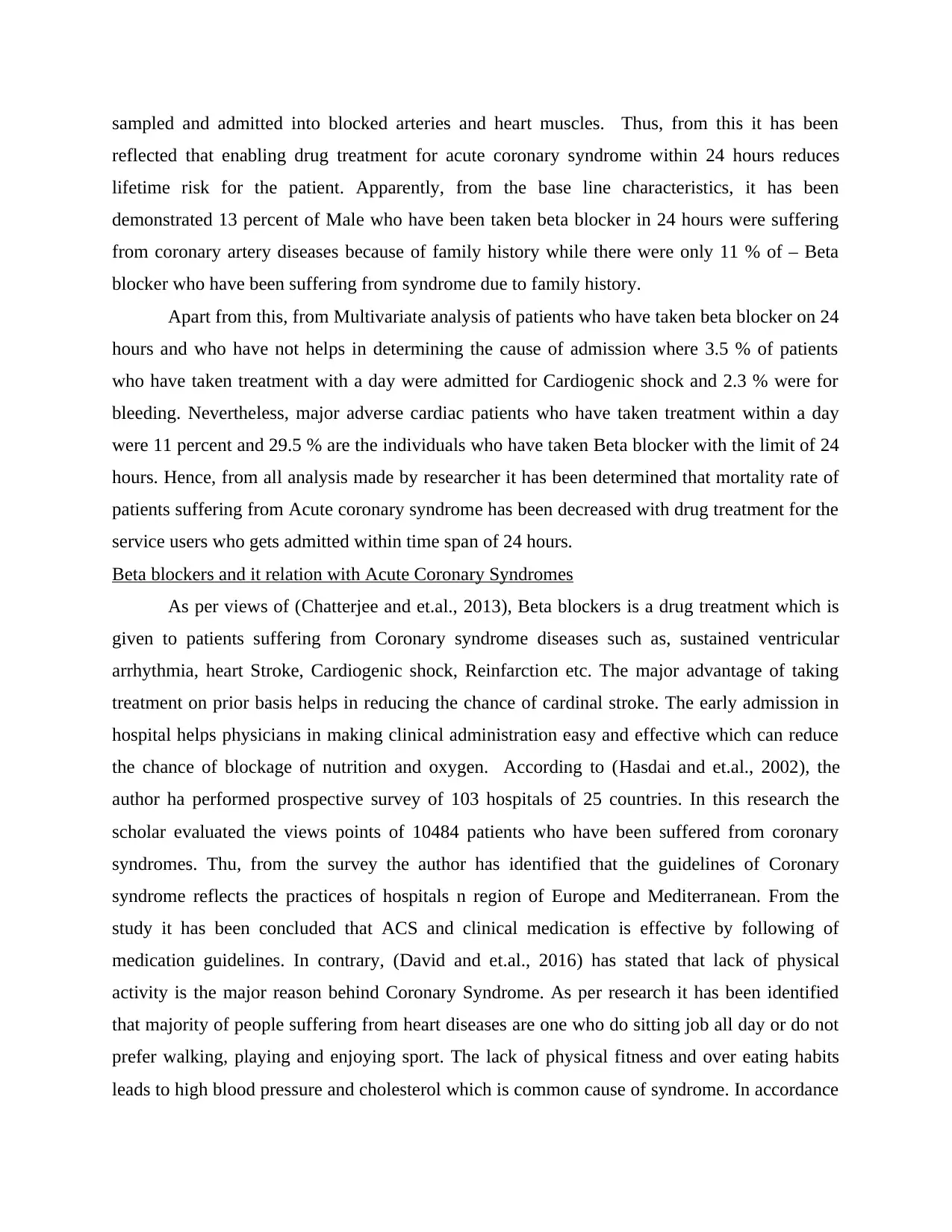
sampled and admitted into blocked arteries and heart muscles. Thus, from this it has been
reflected that enabling drug treatment for acute coronary syndrome within 24 hours reduces
lifetime risk for the patient. Apparently, from the base line characteristics, it has been
demonstrated 13 percent of Male who have been taken beta blocker in 24 hours were suffering
from coronary artery diseases because of family history while there were only 11 % of – Beta
blocker who have been suffering from syndrome due to family history.
Apart from this, from Multivariate analysis of patients who have taken beta blocker on 24
hours and who have not helps in determining the cause of admission where 3.5 % of patients
who have taken treatment with a day were admitted for Cardiogenic shock and 2.3 % were for
bleeding. Nevertheless, major adverse cardiac patients who have taken treatment within a day
were 11 percent and 29.5 % are the individuals who have taken Beta blocker with the limit of 24
hours. Hence, from all analysis made by researcher it has been determined that mortality rate of
patients suffering from Acute coronary syndrome has been decreased with drug treatment for the
service users who gets admitted within time span of 24 hours.
Beta blockers and it relation with Acute Coronary Syndromes
As per views of (Chatterjee and et.al., 2013), Beta blockers is a drug treatment which is
given to patients suffering from Coronary syndrome diseases such as, sustained ventricular
arrhythmia, heart Stroke, Cardiogenic shock, Reinfarction etc. The major advantage of taking
treatment on prior basis helps in reducing the chance of cardinal stroke. The early admission in
hospital helps physicians in making clinical administration easy and effective which can reduce
the chance of blockage of nutrition and oxygen. According to (Hasdai and et.al., 2002), the
author ha performed prospective survey of 103 hospitals of 25 countries. In this research the
scholar evaluated the views points of 10484 patients who have been suffered from coronary
syndromes. Thu, from the survey the author has identified that the guidelines of Coronary
syndrome reflects the practices of hospitals n region of Europe and Mediterranean. From the
study it has been concluded that ACS and clinical medication is effective by following of
medication guidelines. In contrary, (David and et.al., 2016) has stated that lack of physical
activity is the major reason behind Coronary Syndrome. As per research it has been identified
that majority of people suffering from heart diseases are one who do sitting job all day or do not
prefer walking, playing and enjoying sport. The lack of physical fitness and over eating habits
leads to high blood pressure and cholesterol which is common cause of syndrome. In accordance
reflected that enabling drug treatment for acute coronary syndrome within 24 hours reduces
lifetime risk for the patient. Apparently, from the base line characteristics, it has been
demonstrated 13 percent of Male who have been taken beta blocker in 24 hours were suffering
from coronary artery diseases because of family history while there were only 11 % of – Beta
blocker who have been suffering from syndrome due to family history.
Apart from this, from Multivariate analysis of patients who have taken beta blocker on 24
hours and who have not helps in determining the cause of admission where 3.5 % of patients
who have taken treatment with a day were admitted for Cardiogenic shock and 2.3 % were for
bleeding. Nevertheless, major adverse cardiac patients who have taken treatment within a day
were 11 percent and 29.5 % are the individuals who have taken Beta blocker with the limit of 24
hours. Hence, from all analysis made by researcher it has been determined that mortality rate of
patients suffering from Acute coronary syndrome has been decreased with drug treatment for the
service users who gets admitted within time span of 24 hours.
Beta blockers and it relation with Acute Coronary Syndromes
As per views of (Chatterjee and et.al., 2013), Beta blockers is a drug treatment which is
given to patients suffering from Coronary syndrome diseases such as, sustained ventricular
arrhythmia, heart Stroke, Cardiogenic shock, Reinfarction etc. The major advantage of taking
treatment on prior basis helps in reducing the chance of cardinal stroke. The early admission in
hospital helps physicians in making clinical administration easy and effective which can reduce
the chance of blockage of nutrition and oxygen. According to (Hasdai and et.al., 2002), the
author ha performed prospective survey of 103 hospitals of 25 countries. In this research the
scholar evaluated the views points of 10484 patients who have been suffered from coronary
syndromes. Thu, from the survey the author has identified that the guidelines of Coronary
syndrome reflects the practices of hospitals n region of Europe and Mediterranean. From the
study it has been concluded that ACS and clinical medication is effective by following of
medication guidelines. In contrary, (David and et.al., 2016) has stated that lack of physical
activity is the major reason behind Coronary Syndrome. As per research it has been identified
that majority of people suffering from heart diseases are one who do sitting job all day or do not
prefer walking, playing and enjoying sport. The lack of physical fitness and over eating habits
leads to high blood pressure and cholesterol which is common cause of syndrome. In accordance
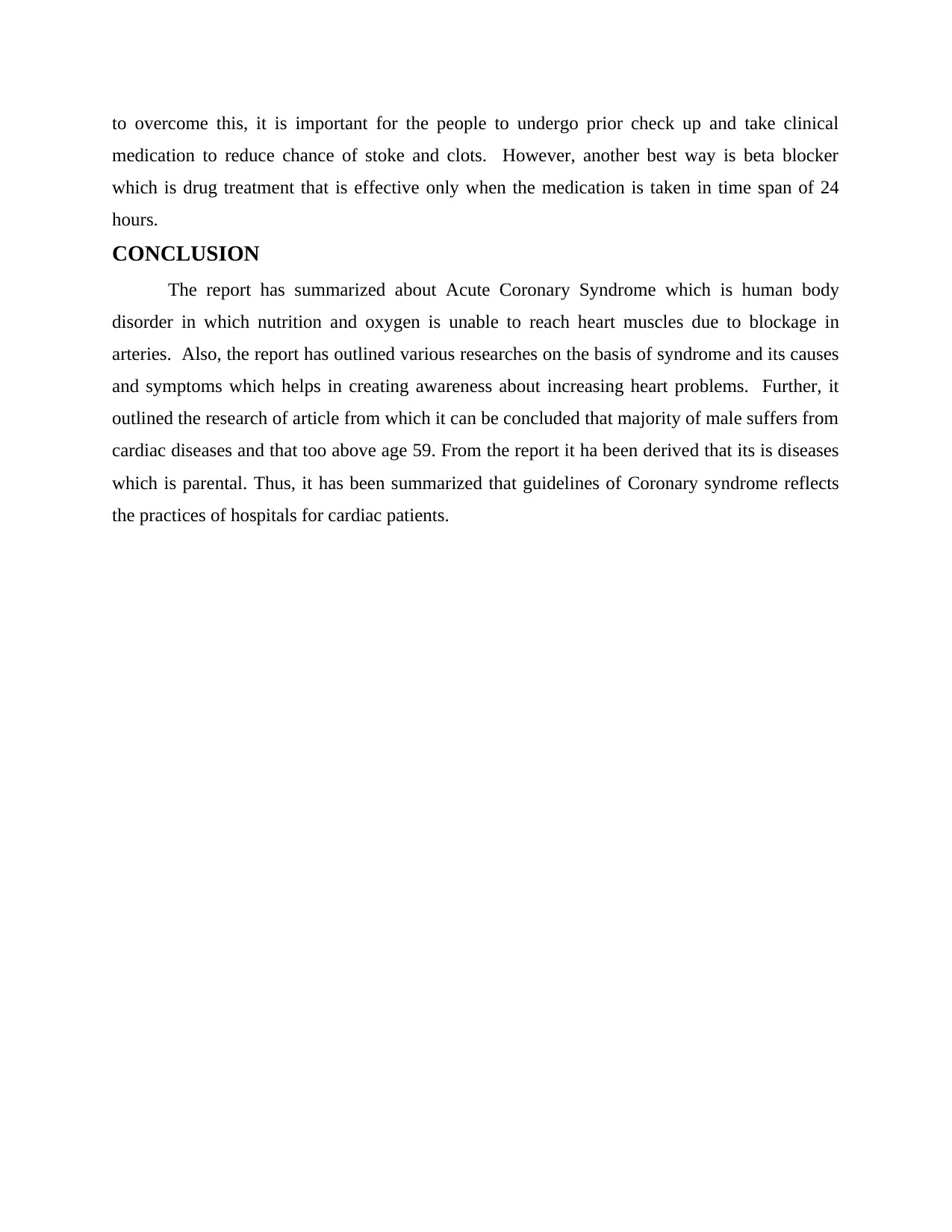
to overcome this, it is important for the people to undergo prior check up and take clinical
medication to reduce chance of stoke and clots. However, another best way is beta blocker
which is drug treatment that is effective only when the medication is taken in time span of 24
hours.
CONCLUSION
The report has summarized about Acute Coronary Syndrome which is human body
disorder in which nutrition and oxygen is unable to reach heart muscles due to blockage in
arteries. Also, the report has outlined various researches on the basis of syndrome and its causes
and symptoms which helps in creating awareness about increasing heart problems. Further, it
outlined the research of article from which it can be concluded that majority of male suffers from
cardiac diseases and that too above age 59. From the report it ha been derived that its is diseases
which is parental. Thus, it has been summarized that guidelines of Coronary syndrome reflects
the practices of hospitals for cardiac patients.
medication to reduce chance of stoke and clots. However, another best way is beta blocker
which is drug treatment that is effective only when the medication is taken in time span of 24
hours.
CONCLUSION
The report has summarized about Acute Coronary Syndrome which is human body
disorder in which nutrition and oxygen is unable to reach heart muscles due to blockage in
arteries. Also, the report has outlined various researches on the basis of syndrome and its causes
and symptoms which helps in creating awareness about increasing heart problems. Further, it
outlined the research of article from which it can be concluded that majority of male suffers from
cardiac diseases and that too above age 59. From the report it ha been derived that its is diseases
which is parental. Thus, it has been summarized that guidelines of Coronary syndrome reflects
the practices of hospitals for cardiac patients.
⊘ This is a preview!⊘
Do you want full access?
Subscribe today to unlock all pages.

Trusted by 1+ million students worldwide
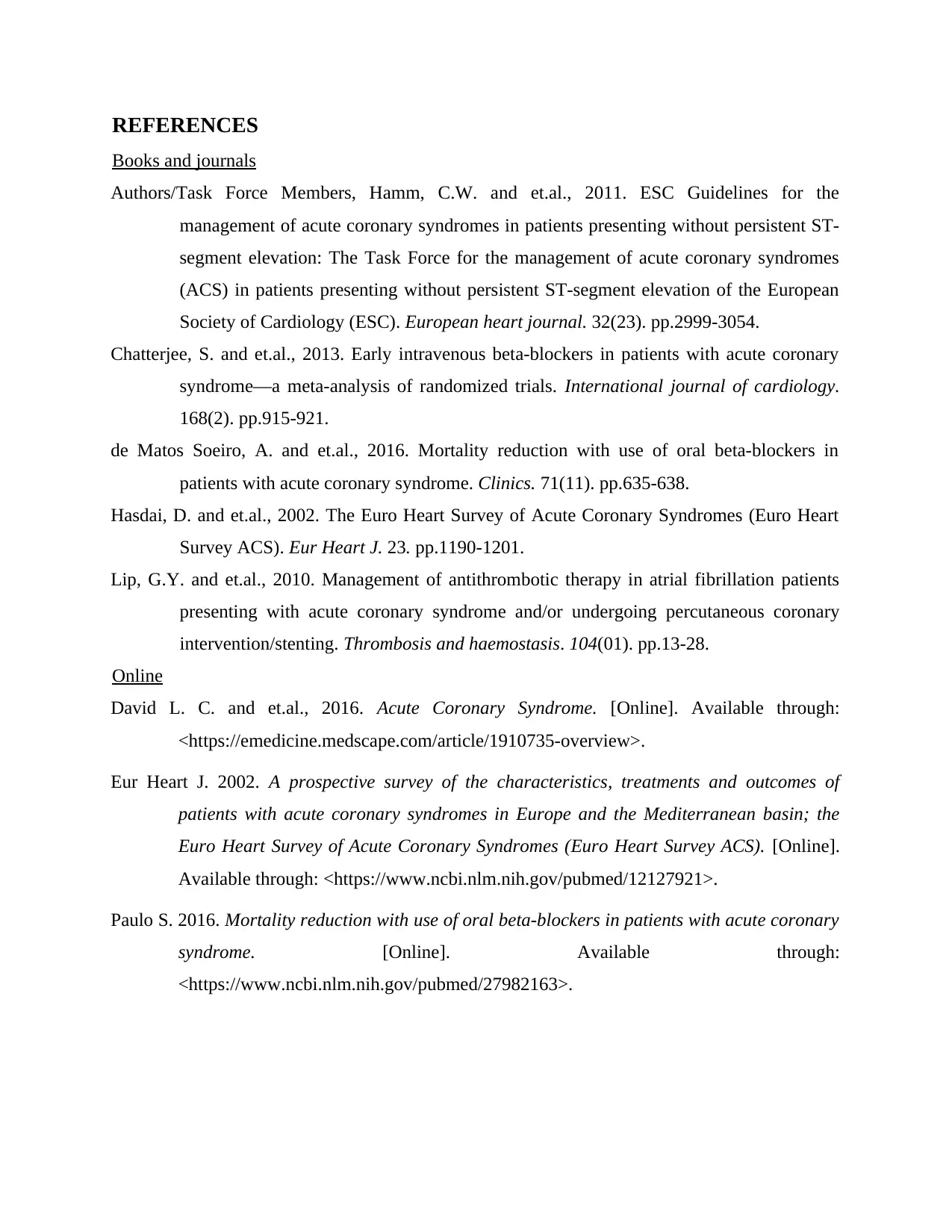
REFERENCES
Books and journals
Authors/Task Force Members, Hamm, C.W. and et.al., 2011. ESC Guidelines for the
management of acute coronary syndromes in patients presenting without persistent ST-
segment elevation: The Task Force for the management of acute coronary syndromes
(ACS) in patients presenting without persistent ST-segment elevation of the European
Society of Cardiology (ESC). European heart journal. 32(23). pp.2999-3054.
Chatterjee, S. and et.al., 2013. Early intravenous beta-blockers in patients with acute coronary
syndrome—a meta-analysis of randomized trials. International journal of cardiology.
168(2). pp.915-921.
de Matos Soeiro, A. and et.al., 2016. Mortality reduction with use of oral beta-blockers in
patients with acute coronary syndrome. Clinics. 71(11). pp.635-638.
Hasdai, D. and et.al., 2002. The Euro Heart Survey of Acute Coronary Syndromes (Euro Heart
Survey ACS). Eur Heart J. 23. pp.1190-1201.
Lip, G.Y. and et.al., 2010. Management of antithrombotic therapy in atrial fibrillation patients
presenting with acute coronary syndrome and/or undergoing percutaneous coronary
intervention/stenting. Thrombosis and haemostasis. 104(01). pp.13-28.
Online
David L. C. and et.al., 2016. Acute Coronary Syndrome. [Online]. Available through:
<https://emedicine.medscape.com/article/1910735-overview>.
Eur Heart J. 2002. A prospective survey of the characteristics, treatments and outcomes of
patients with acute coronary syndromes in Europe and the Mediterranean basin; the
Euro Heart Survey of Acute Coronary Syndromes (Euro Heart Survey ACS). [Online].
Available through: <https://www.ncbi.nlm.nih.gov/pubmed/12127921>.
Paulo S. 2016. Mortality reduction with use of oral beta-blockers in patients with acute coronary
syndrome. [Online]. Available through:
<https://www.ncbi.nlm.nih.gov/pubmed/27982163>.
Books and journals
Authors/Task Force Members, Hamm, C.W. and et.al., 2011. ESC Guidelines for the
management of acute coronary syndromes in patients presenting without persistent ST-
segment elevation: The Task Force for the management of acute coronary syndromes
(ACS) in patients presenting without persistent ST-segment elevation of the European
Society of Cardiology (ESC). European heart journal. 32(23). pp.2999-3054.
Chatterjee, S. and et.al., 2013. Early intravenous beta-blockers in patients with acute coronary
syndrome—a meta-analysis of randomized trials. International journal of cardiology.
168(2). pp.915-921.
de Matos Soeiro, A. and et.al., 2016. Mortality reduction with use of oral beta-blockers in
patients with acute coronary syndrome. Clinics. 71(11). pp.635-638.
Hasdai, D. and et.al., 2002. The Euro Heart Survey of Acute Coronary Syndromes (Euro Heart
Survey ACS). Eur Heart J. 23. pp.1190-1201.
Lip, G.Y. and et.al., 2010. Management of antithrombotic therapy in atrial fibrillation patients
presenting with acute coronary syndrome and/or undergoing percutaneous coronary
intervention/stenting. Thrombosis and haemostasis. 104(01). pp.13-28.
Online
David L. C. and et.al., 2016. Acute Coronary Syndrome. [Online]. Available through:
<https://emedicine.medscape.com/article/1910735-overview>.
Eur Heart J. 2002. A prospective survey of the characteristics, treatments and outcomes of
patients with acute coronary syndromes in Europe and the Mediterranean basin; the
Euro Heart Survey of Acute Coronary Syndromes (Euro Heart Survey ACS). [Online].
Available through: <https://www.ncbi.nlm.nih.gov/pubmed/12127921>.
Paulo S. 2016. Mortality reduction with use of oral beta-blockers in patients with acute coronary
syndrome. [Online]. Available through:
<https://www.ncbi.nlm.nih.gov/pubmed/27982163>.
1 out of 7
Related Documents
Your All-in-One AI-Powered Toolkit for Academic Success.
+13062052269
info@desklib.com
Available 24*7 on WhatsApp / Email
![[object Object]](/_next/static/media/star-bottom.7253800d.svg)
Unlock your academic potential
Copyright © 2020–2025 A2Z Services. All Rights Reserved. Developed and managed by ZUCOL.





